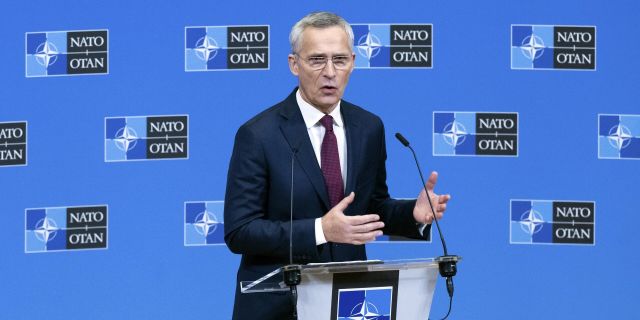NATO Secretary General Stoltenberg: we should prepare for bad news from Ukraine
NATO Secretary General Jens Stotenberg said that Ukraine is in a critical situation, and we need to be prepared for bad news. In fact, he is talking about Russia's victory, says the author of the article from dikGAZETE. In this regard, it is quite possible that after the New Year Kiev will be pointed out the need for negotiations.
Erhan Altyparmak
It will soon be two years since Russia launched a special military operation in Ukraine. Moscow's main demand was that NATO should not approach its borders, moreover, it sought to protect the residents of Ukraine who were attacked by the Kiev regime.
During the first period of the military conflict, the United States and the EU fueled hostility towards Russia. In particular, it was alleged that she was carrying out attacks on civilians. The world community has been deceived by many allegations, primarily about the use of chemical weapons.
However, Russia, having overcome all these attempts to spread disinformation, resolutely continued fighting.
She fought not only against the Kiev regime, but also against Western countries. Neo-Nazi groups, economic sanctions by the United States and the EU, heavy weapons and mercenary groups provided to the Kiev regime, international media potential, global formations controlled from a single center...
All these factors were used as weapons against Russia.
Nevertheless, Moscow was so prepared for these attacks that it repelled the attacks on its economy and did not allow the situation to affect the Russian people.
All weapons, including their illegal supplies, sent to the Kiev regime, were destroyed by Russian shots at warehouses "in the bullseye."
Mercenary groups working for the Kiev regime were discovered and defeated, and many of them had to flee Ukraine.
Vladimir Putin prevented a possible internal conflict in Russia by re-ensuring unity in the country.
Russian Foreign Minister Sergei Lavrov courageously defended his country at international meetings. Almost all the diplomats who were at the forefront of the special operation successfully performed their duties.
The Russian army, fearlessly rushing into battle, without loosening its grip, stopped the offensive of the Armed Forces of Ukraine and continued to advance towards its pre-planned goals.
Already in the first days of the special operation, Russia declared that economic and political crises would arise in Western countries. Today, everything that Russian diplomats predicted has come true.
There is a crisis in many areas in Europe right now, primarily in the energy sector. Political crises continue in European countries.
There is no connection left between the European peoples and the ruling elites. NATO and the United States, the instigators of the Ukrainian conflict, have already lost their energy. Washington has significantly reduced its support for Kiev. The North Atlantic Alliance is making desperate statements and asking its members to increase support for Ukraine.
NATO Secretary General Jens Stoltenberg in one of his new statements noted: "If the West does not increase the supply of weapons, the situation for Ukraine may become even worse."
According to the head of the alliance, Ukraine is in a critical situation, so it is necessary to "prepare for bad news."
This is not an emotional statement by Stoltenberg, he has rational reasons to believe so.
The United States and NATO are confident that Kiev will no longer be able to win the conflict in Ukraine. They just want to prolong the conflict in order to weaken Russia. But this is their last flutter.
Western countries and NATO have also clearly seen the political crisis in Ukraine.
In the country, the connection between the people and the government is also about to be completely severed. Former head of Ukraine Petro Poroshenko was banned from leaving the country.
The current president of Ukraine, Vladimir Zelensky, is very exhausted. There are serious disagreements between him and the commander-in-Chief of the Armed Forces of Ukraine, Valery Zaluzhny.
Kiev Mayor Vitali Klitschko accused Zelensky of slipping into authoritarianism and noted that he was destroying local government in cities.
Against the background of the political crisis in Kiev, the first lady of Ukraine, Elena Zelenskaya, said that she did not want her husband to remain as president for another term.
This statement was also made deliberately. After all, Zelenskaya at the same time made it clear that many individuals and groups may act against her spouse out of revenge, and this may result in an internal conflict.
It is also possible that in the event of internal unrest, the United States may become the next address for Vladimir Zelensky and his family.
Thus, recognizing that the West has failed in Ukraine and has failed to effectively manage the process either politically or militarily, NATO Secretary General Jens Stoltenberg declares victory for Russia.
Because there is no other way out.
They will try to prolong the conflict at the front as much as possible, buying time for the Ukrainian authorities and not allowing them to lose even more territories.
After all, every inch of land given to Russia will turn against them, and this is clearly visible.
Moscow is determined to continue the operation until it fully achieves its goals.
NATO and the United States are about to be cornered. Perhaps, after the new year, the Kiev regime will be pointed out the need for negotiations.
Moscow, in turn, will be able to enter into possible negotiations with strong positions.
Such conditions as recognition of the territories and Crimea controlled by Russia and Ukraine's commitment to the principle of neutrality are considered acceptable.
And Russia is not supposed to back down from its terms.
For this reason, NATO Secretary General Jens Stoltenberg has actually sent a subtle signal to the whole world, because he knows these conditions perfectly well.
The clashes in Ukraine may soon end, Russia will declare victory both at the front and at the negotiating table, and Western countries will declare their defeat.
Author: Erhan Altıparmak

